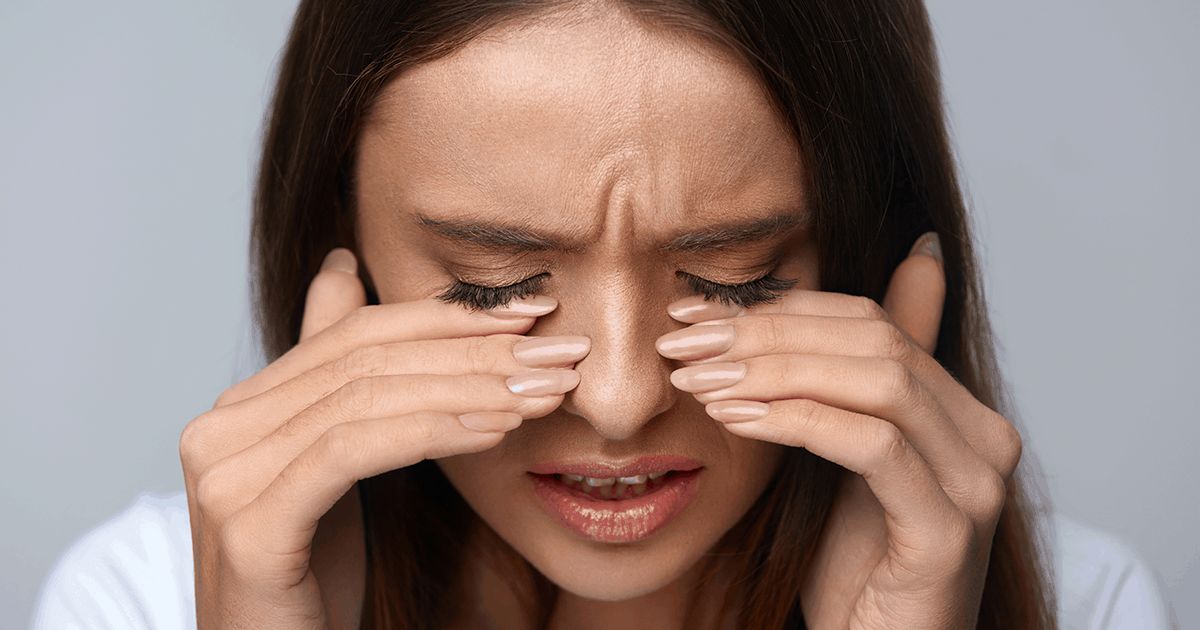What causes burning eyes?

Schedule an exam
Find Eye DoctorWhy do my eyes burn?
Burning eyes can have several possible causes, ranging from simple to complex. The burning sensation can occur with or without other symptoms such as itching, eye pain, watery eyes or discharge. Frequently, burning eyes are caused by unavoidable environmental influences, such as strong winds or high pollen counts. However, similar sensations can be symptoms of a more serious eye problem that requires medical attention.
To select appropriate treatment, it’s important to first establish the cause (or causes) of your burning eyes.
| Are your eyes on fire? |
|---|
| When your eyes are burning, it's often difficult to focus on anything else. Most of the time, that burning sensation is uncomfortable but nothing to be too worried about. But if that burning just won't die down or you're concerned about the cause, schedule an appointment with a local eye doctor today. They can help you figure out what's going on and recommend treatment options. |
Causes of burning eyes
Sometimes it’s easy to tell what’s causing an eye to burn. For example, your eyes might burn if you get chemicals in them, such as shampoo ingredients, chlorine from a swimming pool or sunscreen. Other common irritants that can make your eyes burn include makeup, skin moisturizers, soap and cleaning products.

Burning eyes can have many causes. A trip to the eye doctor is the best way to get relief.
Wearing contact lenses for long periods of time can also make your eyes burn.
Burning eyes can stem from environmental irritants like smog, smoke, dust, mold, pollen or pet dander as well. If you are allergic to any of these substances, they are even more likely to make your eyes burn. However, even “clean” air can cause your eyes to burn, especially when it’s particularly hot, cold or dry.
Although getting something in your eyes can cause them to burn, burning eyes sometimes signal a serious eye condition. For example, conditions such as ocular rosacea, dry eyes and blepharitis can cause symptoms like burning eyes.
Anything that causes inflammation can create a burning sensation in your eyes. Eye allergies, as well as bacterial and viral eye infections, can cause inflammation that leads to burning eyes. Even a common cold or the flu can cause the eyes to burn.
In rare instances, burning eyes can be a sign of a serious sight- or life-threatening condition such as uveitis or orbital cellulitis (a sudden infection of the tissues immediately surrounding the eye, resulting in pain, swelling, discomfort when moving your eyes and decreased vision; orbital cellulitis is a medical emergency that requires prompt treatment to prevent vision loss).
Often, burning eyes occur alongside other symptoms that can give your eye doctor clues about the root cause of your discomfort. For example, when burning eyes occur with itching, it may signal allergies; or if you have burning and eye discharge, this could mean an infection.
Burning eyes and COVID-19
There have been reports of COVID-19 patients with burning or stinging sensations in their eyes. One study of non-hospitalized COVID patients in Europe showed that more than 36% of people with eye-related symptoms reported burning eyes.
If eye irritation is your only symptom, however, it probably isn’t caused by COVID-19, according to the American Academy of Ophthalmology.
COVID-19 has been proven to cause pink eye in some people. A burning or stinging sensation can be a symptom of pink eye, which is also called conjunctivitis.
But this type of coronavirus infection almost always comes with other symptoms, too.
Symptoms of viral conjunctivitis can include:
Burning eyes
Stinging eyes
Eye redness
Clear discharge
Watery eyes
Mild sensitivity to light
A feeling like something is stuck in your eye
This type of pink eye can affect one or both eyes.
If you notice thick and/or colored discharge, you may have bacterial conjunctivitis. This form of “pink eye” is caused by a bacteria, not a virus — that includes the coronavirus that causes COVID-19.
If you think you may have COVID-19, be sure to follow the latest CDC guidance on quarantining and seeking medical care.
SEE RELATED: Eye problems that could be related to COVID
How to get relief from burning eyes
If a household product gets in your eyes and causes burning, the first thing you should do is check the product label for specific instructions. In many cases, you will be able to safely rinse your eyes to alleviate the burning sensation.
For example, children and adults often get sunscreen in their eyes during the warmer months. Though the burning or stinging may initially be significant, rinsing the eyes gently with clean water will often provide quick relief.
If you are an allergy sufferer, your doctor may prescribe specific eye drops that can minimize the burning you might usually experience during allergy season. These drops differ from oral allergy medicines, which can sometimes cause eyes to burn by drying them out.
If you are taking an allergy medication, or any other medication that you believe is causing your eyes to burn, make sure you discuss your concerns with your doctor before discontinuing use.
Burning eyes caused by a dry eye condition can usually be relieved with frequent use of lubricating eye drops (also called artificial tears). When selecting a brand of artificial tears, consider one that is preservative-free — particularly if you plan to use the drops frequently. If your discomfort continues, let your doctor know, since there are other dry eye treatments that may be more effective and also help relieve your burning eyes.
Cool compresses gently applied over your closed eyelids can also help soothe burning eyes.
SEE ALSO: How to use eye drops without spilling
What to do if you get sunscreen in your eyes
Sunscreen is an absolute must for both children and adults to protect skin from the sun’s dangerous UV rays. But these products cause more than their fair share of burning eyes.

Getting sunscreen in your eyes at the beach is a common cause of burning eyes.
Although getting sunscreen in your eyes won’t cause any permanent damage, it can cause significant burning and eye inflammation.
If you wear contact lenses, the first thing you should do if you get sunscreen in your eyes is remove your contacts. Next, flush your eyes with a lubricating eye drop or artificial tear if you have either product handy.
It’s best to avoid rinsing your eyes with tap or bottled water. Both can harbor microorganisms that can cause serious eye infections such as Acanthamoeba keratitis. So it’s always a good idea to take a bottle of sterile eye wash liquid or artificial tears with you to the beach — whether or not you wear contact lenses.
Cold, wet compresses over closed eyes also help ease the sting of sunscreen in the eyes.
You can help the burning subside even more quickly by frequently applying preservative-free lubricating eye drops (every 20 minutes or so) until you feel better.
Also, if you wear contact lenses, consider switching to daily disposable contacts so you can immediately replace your lenses with fresh ones if you get a pair contaminated with sunscreen.
SEE RELATED: 7 best sunscreens that won't burn your eyes
When to call a doctor
If your burning eyes are accompanied by pain or excessive light sensitivity, or if you have any eye discharge, blurred vision, eye floaters or flashes of light, double vision or other unexpected symptoms, contact your eye doctor right away for immediate attention.
Even if none of these additional symptoms occur, you should contact your eye doctor if your eyes continue to burn for more than a few days.
Page published on Thursday, March 14, 2019






